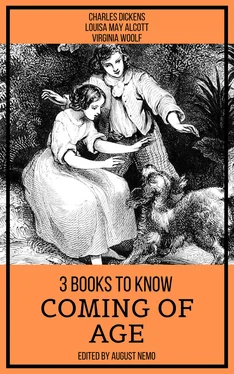This was all the establishment. When we went down-stairs again, Wemmick led me into my guardian's room, and said, "This you've seen already."
"Pray," said I, as the two odious casts with the twitchy leer upon them caught my sight again, "whose likenesses are those?"
"These?" said Wemmick, getting upon a chair, and blowing the dust off the horrible heads before bringing them down. "These are two celebrated ones. Famous clients of ours that got us a world of credit. This chap (why you must have come down in the night and been peeping into the inkstand, to get this blot upon your eyebrow, you old rascal!) murdered his master, and, considering that he wasn't brought up to evidence, didn't plan it badly."
"Is it like him?" I asked, recoiling from the brute, as Wemmick spat upon his eyebrow and gave it a rub with his sleeve.
"Like him? It's himself, you know. The cast was made in Newgate, directly after he was taken down. You had a particular fancy for me, hadn't you, Old Artful?" said Wemmick. He then explained this affectionate apostrophe, by touching his brooch representing the lady and the weeping willow at the tomb with the urn upon it, and saying, "Had it made for me, express!"
"Is the lady anybody?" said I.
"No," returned Wemmick. "Only his game. (You liked your bit of game, didn't you?) No; deuce a bit of a lady in the case, Mr. Pip, except one—and she wasn't of this slender ladylike sort, and you wouldn't have caught her looking after this urn—unless there was something to drink in it." Wemmick's attention being thus directed to his brooch, he put down the cast, and polished the brooch with his pocket-handkerchief.
"Did that other creature come to the same end?" I asked. "He has the same look."
"You're right," said Wemmick; "it's the genuine look. Much as if one nostril was caught up with a horsehair and a little fish-hook. Yes, he came to the same end; quite the natural end here, I assure you. He forged wills, this blade did, if he didn't also put the supposed testators to sleep too. You were a gentlemanly Cove, though" (Mr. Wemmick was again apostrophizing), "and you said you could write Greek. Yah, Bounceable! What a liar you were! I never met such a liar as you!" Before putting his late friend on his shelf again, Wemmick touched the largest of his mourning rings and said, "Sent out to buy it for me, only the day before."
While he was putting up the other cast and coming down from the chair, the thought crossed my mind that all his personal jewellery was derived from like sources. As he had shown no diffidence on the subject, I ventured on the liberty of asking him the question, when he stood before me, dusting his hands.
"Oh yes," he returned, "these are all gifts of that kind. One brings another, you see; that's the way of it. I always take 'em. They're curiosities. And they're property. They may not be worth much, but, after all, they're property and portable. It don't signify to you with your brilliant look-out, but as to myself, my guidingstar always is, 'Get hold of portable property.'"
When I had rendered homage to this light, he went on to say, in a friendly manner:
"If at any odd time when you have nothing better to do, you wouldn't mind coming over to see me at Walworth, I could offer you a bed, and I should consider it an honour. I have not much to show you; but such two or three curiosities as I have got, you might like to look over; and I am fond of a bit of garden and a summer-house."
I said I should be delighted to accept his hospitality.
"Thankee," said he; "then we'll consider that it's to come off, when convenient to you. Have you dined with Mr. Jaggers yet?"
"Not yet."
"Well," said Wemmick, "he'll give you wine, and good wine. I'll give you punch, and not bad punch. And now I'll tell you something. When you go to dine with Mr. Jaggers, look at his housekeeper."
"Shall I see something very uncommon?"
"Well," said Wemmick, "you'll see a wild beast tamed. Not so very uncommon, you'll tell me. I reply, that depends on the original wildness of the beast, and the amount of taming. It won't lower your opinion of Mr. Jaggers's powers. Keep your eye on it."
I told him I would do so, with all the interest and curiosity that his preparation awakened. As I was taking my departure, he asked me if I would like to devote five minutes to seeing Mr. Jaggers "at it?"
For several reasons, and not least because I didn't clearly know what Mr. Jaggers would be found to be "at," I replied in the affirmative. We dived into the City, and came up in a crowded policecourt, where a blood-relation (in the murderous sense) of the deceased with the fanciful taste in brooches, was standing at the bar, uncomfortably chewing something; while my guardian had a woman under examination or cross-examination—I don't know which—and was striking her, and the bench, and everybody present, with awe. If anybody, of whatsoever degree, said a word that he didn't approve of, he instantly required to have it "taken down." If anybody wouldn't make an admission, he said, "I'll have it out of you!" and if anybody made an admission, he said, "Now I have got you!" the magistrates shivered under a single bite of his finger. Thieves and thieftakers hung in dread rapture on his words, and shrank when a hair of his eyebrows turned in their direction. Which side he was on, I couldn't make out, for he seemed to me to be grinding the whole place in a mill; I only know that when I stole out on tiptoe, he was not on the side of the bench; for, he was making the legs of the old gentleman who presided, quite convulsive under the table, by his denunciations of his conduct as the representative of British law and justice in that chair that day.
Bentley Drummle, who was so sulky a fellow that he even took up a book as if its writer had done him an injury, did not take up an acquaintance in a more agreeable spirit. Heavy in figure, movement, and comprehension—in the sluggish complexion of his face, and in the large awkward tongue that seemed to loll about in his mouth as he himself lolled about in a room—he was idle, proud, niggardly, reserved, and suspicious. He came of rich people down in Somersetshire, who had nursed this combination of qualities until they made the discovery that it was just of age and a blockhead. Thus, Bentley Drummle had come to Mr. Pocket when he was a head taller than that gentleman, and half a dozen heads thicker than most gentlemen.
Startop had been spoilt by a weak mother and kept at home when he ought to have been at school, but he was devotedly attached to her, and admired her beyond measure. He had a woman's delicacy of feature, and was—"as you may see, though you never saw her," said Herbert to me—exactly like his mother. It was but natural that I should take to him much more kindly than to Drummle, and that, even in the earliest evenings of our boating, he and I should pull homeward abreast of one another, conversing from boat to boat, while Bentley Drummle came up in our wake alone, under the overhanging banks and among the rushes. He would always creep in-shore like some uncomfortable amphibious creature, even when the tide would have sent him fast upon his way; and I always think of him as coming after us in the dark or by the back-water, when our own two boats were breaking the sunset or the moonlight in mid-stream.
Herbert was my intimate companion and friend. I presented him with a half-share in my boat, which was the occasion of his often coming down to Hammersmith; and my possession of a halfshare in his chambers often took me up to London. We used to walk between the two places at all hours. I have an affection for the road yet (though it is not so pleasant a road as it was then), formed in the impressibility of untried youth and hope.
Читать дальше












